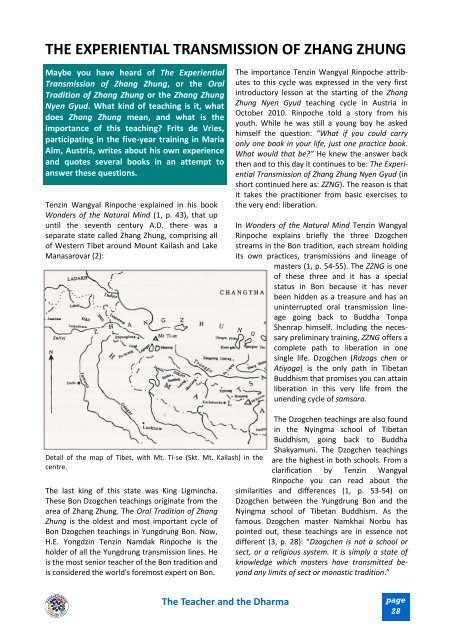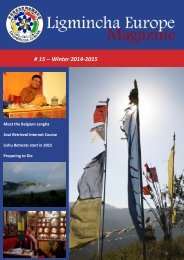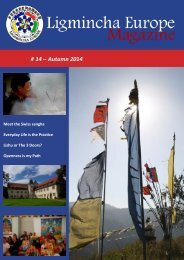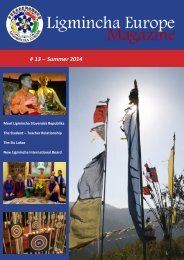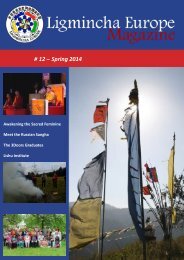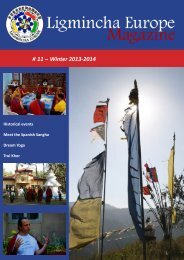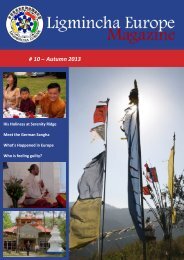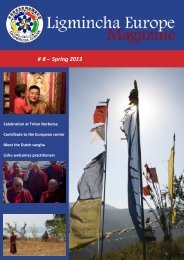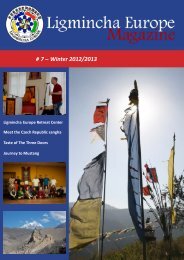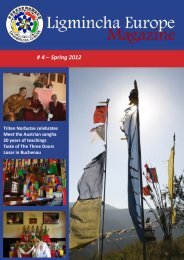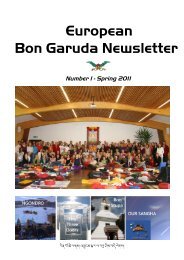Ligmincha Europe Magazine # 9 – Summer 2013
European Magazine of the Ligmincha Sangha of Tenzin Wangyal Rinpoche. Informs about news, events, teachings and projects within the Bon-Buddhist Sangha.
European Magazine of the Ligmincha Sangha of Tenzin Wangyal Rinpoche. Informs about news, events, teachings and projects within the Bon-Buddhist Sangha.
Create successful ePaper yourself
Turn your PDF publications into a flip-book with our unique Google optimized e-Paper software.
THE EXPERIENTIAL TRANSMISSION OF ZHANG ZHUNG<br />
Maybe you have heard of The Experiential<br />
Transmission of Zhang Zhung, or the Oral<br />
Tradition of Zhang Zhung or the Zhang Zhung<br />
Nyen Gyud. What kind of teaching is it, what<br />
does Zhang Zhung mean, and what is the<br />
importance of this teaching? Frits de Vries,<br />
participating in the five-year training in Maria<br />
Alm, Austria, writes about his own experience<br />
and quotes several books in an attempt to<br />
answer these questions.<br />
Tenzin Wangyal Rinpoche explained in his book<br />
Wonders of the Natural Mind (1, p. 43), that up<br />
until the seventh century A.D. there was a<br />
separate state called Zhang Zhung, comprising all<br />
of Western Tibet around Mount Kailash and Lake<br />
Manasarovar (2):<br />
Detail of the map of Tibet, with Mt. Ti-se (Skt. Mt. Kailash) in the<br />
centre.<br />
The last king of this state was King <strong>Ligmincha</strong>.<br />
These Bon Dzogchen teachings originate from the<br />
area of Zhang Zhung. The Oral Tradition of Zhang<br />
Zhung is the oldest and most important cycle of<br />
Bon Dzogchen teachings in Yungdrung Bon. Now,<br />
H.E. Yongdzin Tenzin Namdak Rinpoche is the<br />
holder of all the Yungdrung transmission lines. He<br />
is the most senior teacher of the Bon tradition and<br />
is considered the world's foremost expert on Bon.<br />
The Teacher and the Dharma<br />
The importance Tenzin Wangyal Rinpoche attributes<br />
to this cycle was expressed in the very first<br />
introductory lesson at the starting of the Zhang<br />
Zhung Nyen Gyud teaching cycle in Austria in<br />
October 2010. Rinpoche told a story from his<br />
youth. While he was still a young boy he asked<br />
himself the question: “What if you could carry<br />
only one book in your life, just one practice book.<br />
What would that be?” He knew the answer back<br />
then and to this day it continues to be: The Experiential<br />
Transmission of Zhang Zhung Nyen Gyud (in<br />
short continued here as: ZZNG). The reason is that<br />
it takes the practitioner from basic exercises to<br />
the very end: liberation.<br />
In Wonders of the Natural Mind Tenzin Wangyal<br />
Rinpoche explains briefly the three Dzogchen<br />
streams in the Bon tradition, each stream holding<br />
its own practices, transmissions and lineage of<br />
masters (1, p. 54-55). The ZZNG is one<br />
of these three and it has a special<br />
status in Bon because it has never<br />
been hidden as a treasure and has an<br />
uninterrupted oral transmission lineage<br />
going back to Buddha Tonpa<br />
Shenrap himself. Including the necessary<br />
preliminary training, ZZNG offers a<br />
complete path to liberation in one<br />
single life. Dzogchen (Rdzogs chen or<br />
Atiyoga) is the only path in Tibetan<br />
Buddhism that promises you can attain<br />
liberation in this very life from the<br />
unending cycle of samsara.<br />
The Dzogchen teachings are also found<br />
in the Nyingma school of Tibetan<br />
Buddhism, going back to Buddha<br />
Shakyamuni. The Dzogchen teachings<br />
are the highest in both schools. From a<br />
clarification by Tenzin Wangyal<br />
Rinpoche you can read about the<br />
similarities and differences (1, p. 53-54) on<br />
Dzogchen between the Yungdrung Bon and the<br />
Nyingma school of Tibetan Buddhism. As the<br />
famous Dzogchen master Namkhai Norbu has<br />
pointed out, these teachings are in essence not<br />
different (3, p. 28): “Dzogchen is not a school or<br />
sect, or a religious system. It is simply a state of<br />
knowledge which masters have transmitted beyond<br />
any limits of sect or monastic tradition.”<br />
page<br />
28


